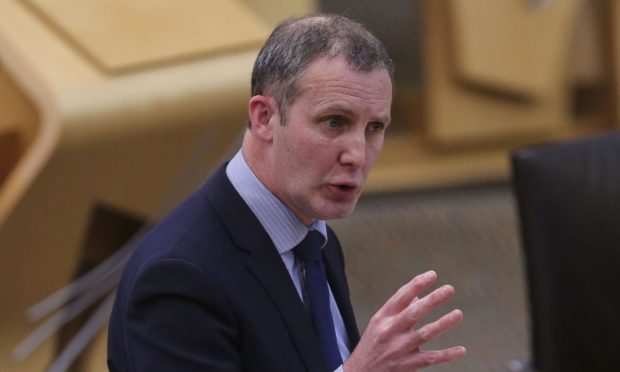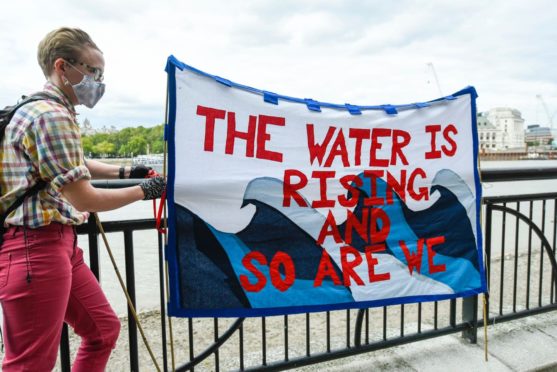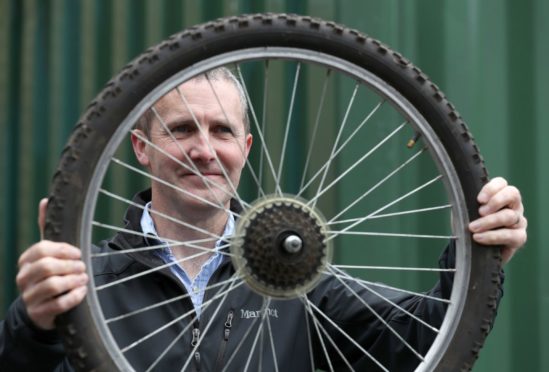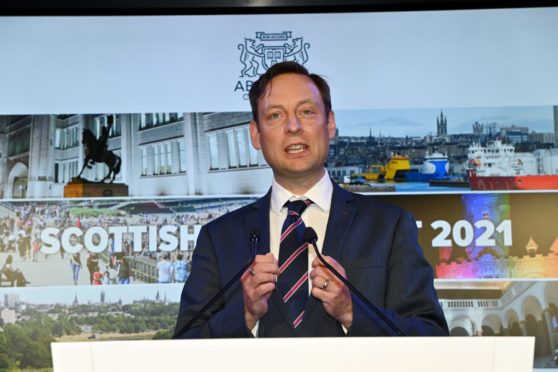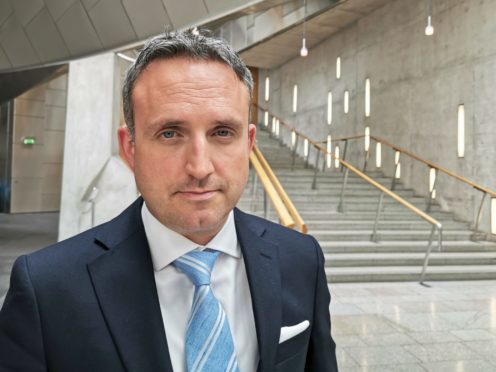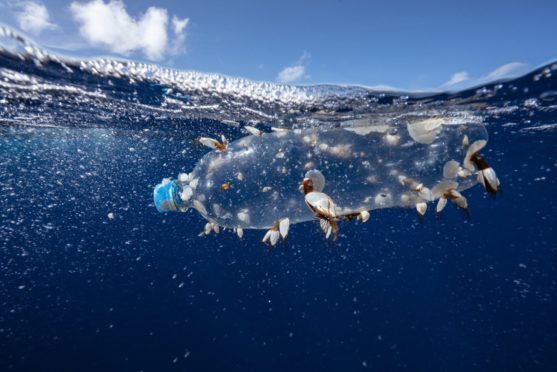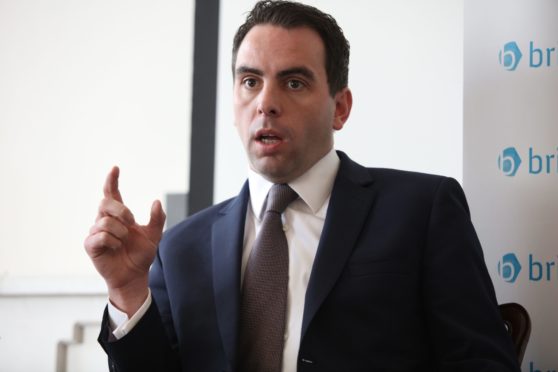The 2020s will be a “defining decade for all of us” when it comes to climate change, according to Scotland’s minister for net zero.
Michael Matheson, minister for net zero, energy and transport, said “every aspect” of people’s lives must change if Scotland is to meet its climate change targets during a debate on the issue at Holyrood.
He added 60% of the changes needed to meet these targets would require a complete societal change of behaviour.
What has been achieved in 30 years now needs done in just 10
Speaking in Holyrood, Mr Matheson said: “We are already seeing the impact of the global climate crisis here in Scotland with warming temperatures, extreme weather and rising sea levels.
“This impacts on the health of the world and our economy, and this will only increase as temperatures continue to rise.
“It is estimated every degree will cost 1% of GDP which effectively eliminates the prospect of growing our economy.
“Our distinctive and ambitious approach to tackling climate change and ecological decline will be built on building climate resilience and protecting our environment in a just and fair way.
“We have already halved greenhouse gas emissions since 1990 and Scotland has decarbonised more quickly than any G20 economy since 2008.
“Our drivers benefit from 25% more public electric charging points than in England, and double the access in Wales and Northern Ireland.
“In the last two years Scotland created over 22,000 hectares of new woodland, which is 80% of the UK woodland creation.
“But what is clear is the second half of our journey to net zero will be more challenging as what we have to achieve in the next 10 years has previously taken us over 30 years.”
Scotland must ‘seize the opportunity’, says cabinet secretary
Mr Matheson says the Scottish Government has 150 different policies to help the country meet its climate change targets, and says the plans will showcase Scotland’s ambitions ahead of the COP26 summit later this year.
He added some of the key policies the government will be looking at include installing more electric car charging points and heating homes using greener energy.
He added: “This will be a decisive and distinctive decade for us all.
“Scotland is on a pathway to meeting out targets over the next decade which brings together 150 polices to drive, deliver and build a credible package of measures to reduce emissions.
“This includes reducing car use by 20% by 2030 and encouraging more active travel and public transport.
“We need to create 20 minute neighbourhoods allowing people to access key services where they live.
“We need to reduce emissions to zero to build our national resilience to global climate change and we have an ambitious £250 million 10 year programme on peatland restoration.
“This journey to net zero will affect every aspect of our lives – how we live, how we work, and how we travel.
This journey to net zero will affect every aspect of our lives – how we live, how we work, and how we travel.
“But Scotland must seize this opportunity.”
The plans include the government’s ‘green growth accelerator’, which is a new investment programme designed to speed up the delivery of low carbon projects.
Pleased to launch the Green Growth Accelerator. The programme will unlock £200m of public sector investment in infrastructure to help drive our transition to net zero. https://t.co/l40lCDRWOW
— Michael Matheson MSP (@MathesonMichael) June 9, 2021
Once opened, the programme will unlock £200m of public sector investment to help Scotland meet its climate targets, and builds on the growth accelerator model which was used to support the Dundee Waterfront development.
Opposition parties vow to work together to tackle climate change
At the climate change debate, opposition politicians from across the chamber vowed to support the government in its plans to tackle climate change.
Liam Kerr from the Scottish Conservatives emphasised the need for more electric car charging points across Scotland.
He said: “We know transport is the largest sector creating climate change emissions.
“We also know that there was increased car use across Scotland before the pandemic – up 7.7% over the five years to 2018-19.
“This week the Department for Transport suggested traffic on British roads is now nearly at pre-pandemic levels whilst public transport use remains around half the levels.
“I think we could be on the cusp of exponential growth in electric cars but range anxiety, limited recharging networks and high purchase cost are holding this back and that’s why we must accelerate the programme to install a charging network.”
We could be on the cusp of exponential growth in electric cars but range anxiety, limited recharging networks and high purchase cost are holding this back.
He also called for hydrogen trains to be introduced to Scotland’s rail network, as currently only 25% of the network is electrified.
Monica Lennon from Scottish Labour added Scotland has the chance to put the entire world on the road to climate recovery with its policies and with the upcoming COP26 summit.
Mark Ruskell from the Scottish Greens called for more to be done to encourage people to cycle to reduce the nation’s reliance on cars, by making it safer for cyclists.
This was echoed by Alex Cole-Hamilton from the Scottish Lib Dems, who used Amsterdam as an example of how a city can be made safe and attractive for cyclists.
More plastic than fish in the sea if plastic pollution continues
During the debate, Conservative Maurice Golden warned there will soon be “more plastic in the sea than fish” if more is not done to tackle plastic pollution.
He says the government needs to set a plastic pollution baseline and launch a survey vessel.
The North East MSP said: “Plastic pollution is a growing threat and one which runs the risk of accelerating climate change.
“If we don’t change, there will be more plastic, by weight, in the seas than there are fish.
“But the last five years have seen the SNP government preside over a catalogue of failures to meet their own targets.
“We need a step change in approach if we are going to create a circular economy, improve biodiversity and truly tackle climate change.
We need a step change in approach if we are going to create a circular economy, improve biodiversity and truly tackle climate change.
“We need to establish a plastic pollution baseline for Scotland with a dedicated survey vessel in place to properly inform future policy, and we should launch a public awareness campaign to remind drivers to keep tyres properly inflated – a simple measure but one that could have a lasting impact.
“The SNP must now work across the chamber with MSPs who have the knowledge and expertise to deliver our climate change targets, create a circular economy and establish Scotland as a plastic-neutral nation.”
He also noted how much recycling is currently done in Scotland, and noted that Dundee City Council’s levels of recycling fall below the national average.
The Scottish Government’s target for local authorities is for them to recycle 70% of household waste by 2025.
Currently Dundee City Council recycles only 38% of its rubbish, and its target is to increase this to 48% within the next three years.
